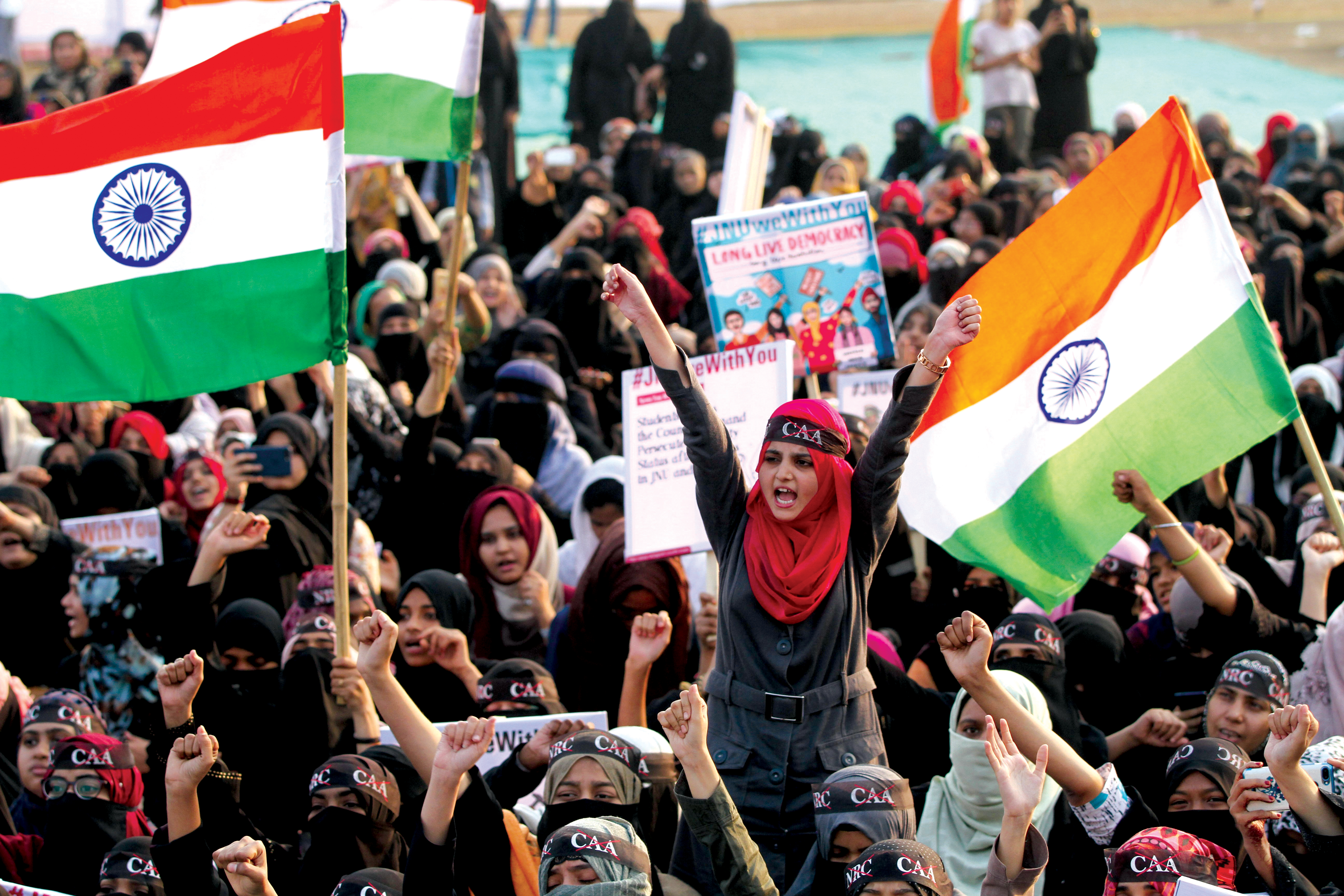What motivates the Muslim women who are coming out in large numbers to protest day and night against CAA and NRC? They are moved by an astonishing amount of determination and tenacity
THE WOMEN are not giving up. They ask if the government thinks they are mad to sit in the bitter cold, day and night, demanding to be heard. Some others want to categorically point out their own citizenship of this land, and question the government which they think is “going after Muslims”.
And it’s just not just the Muslims who have come out to speak against the Citizenship Amendment Act (CAA) — it’s people from all faiths, and walk of life — especially women.
From Jamia Milia Islamia, the women shielding the boys from Delhi Police’s lathis became the face of the movement against police brutality. Then when Jawaharlal Nehru University saw masked goons enter the premises, it was Aishe Ghosh’ blood-stained face which has provoked many to raise their voice.
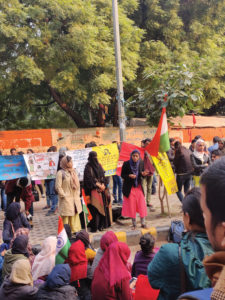
And just like these students, in Bollywood too, it is the women who are spearheading the movement with the likes of Deepika Padukone, Swara Bhaskar and Richa Chadda, to name a few.
After the violence in JNU (on January 5th) Padukone’s support by way of showing up at a protest in the premises, was iconic in itself.
Iffat, an eyewitness of the January 5 attack, spoke with us after she delivered a speech in Jantar Mantar where she called out the government as being “scared because we are not”.
A first-year students of Master’s in Arabic, she also spoke about how the mob targeted the hostel rooms of the Muslims.
She was in the meeting organised by JNU Teachers Association when a mob of masked men and women entered the campus. “We got scared. The nearest hostel was Sabarmati so we ran there”, she tells us.
Some went towards the men’s wing and some towards the women’s wing but the mob entered the premises, “So we ran into the mess”.
In subsequent protests, she says, Muslim women have been targeted. She gives us an example of January 9 when police lathi-charged protestors who were making their way peacefully towards Rashtrapathi bhavan. “One policeman said, ‘Burkhe wali ko aur maro’.” This is also the reason why they gathered at Jantar Mantar that day, “because of the heavy-handedness of the police on women, especially those wearing burqas”.
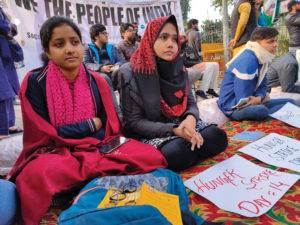
In another protest in Jamia, students are taking turns to go on a ‘hunger strike’ till the government does not hear the people out. On Day 14 of the strike, we met Zeba Samreen and Samia, classmates at Jamia, where they are studying dentistry.
They protest every day outside Jamia from morning till 6 pm in the evening, after which they go to Shaheen Bagh to render their support to the women sitting there.
The two make up the thousands who have been raising their voices. While students are familiar with demonstrations for demanding their rights, the other women we spoke with are leaving their homes to show their strength – a feat they themselves say they have never witnessed before.
But what makes them strong is their determination that till the Citizenship Amendment Act is not revoked or changed to include Muslims, they will go on. Prime Minister Narendra Modi’s assurance that they have no plans to bring in a nation-wide National Registry of Citizens yet, has no takers here. This because the Home Minister Amit Shah has repeatedly said they will remove the “termites”(referring to illegal immigrants) who have found refuge here.
We met 62-year-old Salma outside the gates of Jamia Milia Islamia where she has been coming every day since the police entered the grounds of the university on December 15, lobbing teargas shells and wielding lathis — also opening fire inside the premises, a charge which they have recently admitted to.
Salma believes that the government is hiding its inefficiencies by coming up with the CAA and NRC. Mumtaz gives us an analogy to describe how she feels: “If you’re unwell and are told you have cancer, how scared would you get? This CAA is like that. A cancer. People can’t see their cough and cold, this is the only thing people see. They are scared.”
Her children are alumni of Jamia. Two of them, engineering graduates, are now sitting at home jobless. “They want to give other people refuge in this country. You don’t have food to give, medicines to provide, employment. My children have never done anything wrong, they love their country, they are helpful kids, but you will not give them jobs? You will give those people jobs who pick up the flag and then go to break the Babri Masjid?” she asks.
“Why are so many speaking out? All (of us) are not mad, are they? There has to be a reason for us to be here and yet they don’t speak to us. You have made everyone your enemy?” she asks.
Mumtaz, a protestor we meet at Shaheen Bagh asks the same, if “they” think “we are mad”.
Unlike Salma, who comes to attend the protest by herself, is accompanied by her two children like many other women here. She says at least hers are old enough, but many others have their toddlers who are too young to be left alone at home and younger still to understand why this is important for them.
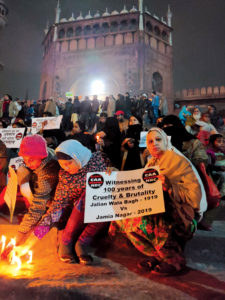
The grounds of Shaheen Bagh have been echoing with the calls of Azaadi, and Inqalab Zindabad and the majority of women here are certain of one thing – their voices will not be quietened till what they ask is granted.
Mumtaz tells us about her seven-year-old son and how he tries to piece together what is happening in his country. “He was studying one evening and came up to me as I was working in the kitchen, and asked: ‘Our Hindustan is great, right?’ I said, Yes son, it is… so then he asked ‘Why is Modiji doing this in our country? Why did he do this in our country’s biggest university’? I was shocked I left my work and spoke to him.”
It has been a month since she started coming for the protests, it has also been a month since the protests began at Shaheen Bagh — a site which has now become the face of defiance. She is one of the thousands of women who have taken out the time to come and show solidarity, and many say it’s something they had never thought they would do.
“I go to Jamia Milia Islamia and then come to Shaheen Bagh”, Mumtaz says. Even today when we met her she first went to Jamia Milia at 3 pm sat there for a couple of hours and then made her way to where she now sits. And this is more than unusual from her routine that she has practised for all the 35 years of her life.
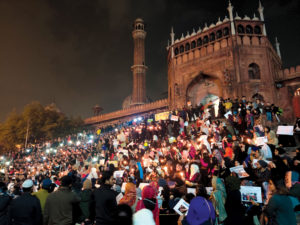
“I’m someone who stays at home, does all the work at home and then in the afternoon I get some time off to rest. This is the time I really loved.” And now this time of rest has become a time to raise her voice. “Now I don’t feel like staying at home even for a moment. I think if I don’t go today and then other women think the same the crowd of people will decrease”, so she comes “because when we see a larger crowd we are reassured that there are many like us”.
But she is a woman who is angry, angry at Bollywood stars who she says have rendered their support to the BJP and the CAA without understanding their plight. “I’m not even that well educated, but what about people like Juhi Chawla, what excuse does she have?”, she asks angrily.
Chawla at an event organised by the ruling BJP at Swatantryaveer Savarkar Smarak to “educate people on Citizenship Amendment Act (CAA), National Register of Citizenship (NRC)” voiced her support to the Prime Minister. She also said, “Do we break our joint family if there are differences? No. We talk to each other. Whatever is happening in the country one needs to understand it first and then speak about it. India is the largest democracy in the world and it is not only the government’s responsibility to bind us together but also our own responsibility to stick with one another in times of need”.
Mumtaz raises her pitch and says: When they could understand what the plan of the ruling party was, then why not the educated lot? “The thing that our Home Minister (Amit Shah) and Prime Minister (Narendra Modi) keep talking about (for nationwide NRC) and saying things like you can recognise people from the clothes they wear. Do you think we are mad that we don’t understand? What about Juhi Chawla, how much money is she getting to speak in favour of the BJP? What about Mukesh Khanna? I was a young girl when Shaktiman use to come, he was my idol. If you can’t support us at least don’t say things like this.”
While Mumtaaz was one of several women who unequivocally voiced their disdain for this government, she was also one who thanked him for bringing the women together. “I thank Modi we never came outside our homes like this, but now he has given us so much confidence and strength to step out of our homes. Our husbands say it doesn’t matter if no housework gets done, go to protest, if you want…and God willing we will get justice”, she adds with still as much gusto as when we began our conversation.
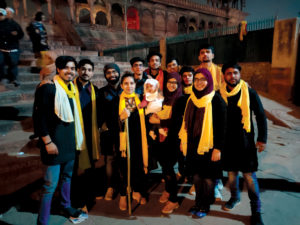
She fears for her children, her question is when they grow up, ‘would they have to also see the day that students of Jamia or AMU or JNU saw?’ This is of grave concern to her and also one of the reasons why she comes here. “I understand the pain of those mothers whose children have been beaten. One of my children lives in a hostel in Dehradun. Even if he has a fight with a student or if a teacher reprimands him, I am unable to sleep at night. Think about the plight of those mothers whose children faced this brutality”.
And this is why Salma, a grandmother, feels the need to attend protest every day. Like Mumtaz, she decided she couldn’t stay quiet while students were facing brutality. “Children were preparing for their exams in the library (of Jamia). You couldn’t control the people outside so you came inside and beat up the children inside their university in the library? Which mother or grandmother will stay put? We can’t pick up a lathi but we can come here and protest”, she says raising her voice. “This is the only way we can protest, peacefully protest.”
So even when protests are taking place every single day, she cannot fathom why the government is not moved to have a dialogue. “Why are so many speaking out? All of us are not mad, are we? There has to be a reason. You have made everyone your enemy?”
ACTING OUT ‘AZAADI’
Staging the entire ordeal of what the students at Jamia went through in the evening of December 15, the play ‘Jamia Wallah Bagh’ was performed on December 27. While the comparison of the violence at the University with the Jallianwala Bagh massacre drew criticism – pushing them to change the name – it was also met with cheers and positive response. They decided to take it forward and perform it in other places as well.
We saw them at Jama Masjid on January 15 performing to large group of protestors gathered there. “Awaaz do. Hum ek hain,” – with candles and posters in one hand, the few thousand-odd protestors gathered, raising their fists and echoed the slogans raised by street play performers.
Clad in black kurtas, a bunch of students and alumni members from various universities got together at Jama Masjid around 9 pm on Wednesday to stage their play ‘Hum sab Hindustani’.
Met with loud cheers, they spurred on the crowd to join in their sloganeering. As soon as the play ended, one of the performers rushed to the side to hold her infant. Ruhi Naaz introduces herself as a married woman with two kids.
Hailing from Faridabad, Ruhi felt the need to raise her voice after her husband and brother faced police brutality as part of the protests in Jamia Nagar on December 15. “Even though I didn’t face it, it was quite personal and so I had to do something.”
Part of the Hamdard Alumni Association, she contacted a few friends and proposed the idea of staging a play in the group. Many of them came forward from different universities and they performed for the first time on December 27 at Jamia Milia Islamia. Met with cheers and positive response, they decided to take it forward and perform it in other places as well.
Comparing the violence at the University with the Jallianwala Bagh massacre they titled the play ‘Jamia Wallah Bagh’. The name however led to a controversy and they changed it.
“When we first performed it, things had only happened in Jamia, but soon after many other incidents happened in various other universities and different parts of the country. So, we upgraded the play and changed its name to keep it more relevant.”
Coming from different parts of the city the group meets twice a week to practice and has already performed in Shaheen Bagh, Jamia university and Jama Masjid.

